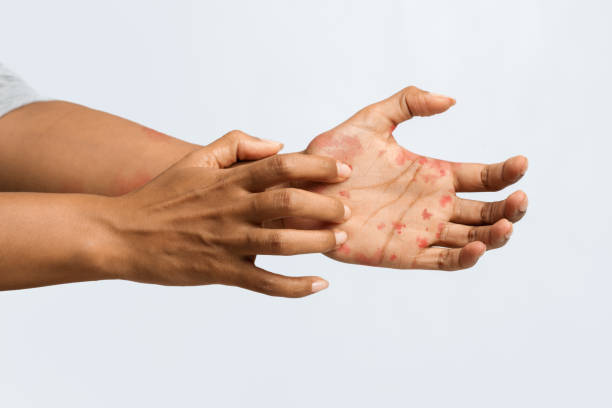What Are the Symptoms of Skin Psoriasis?
Skin psoriasis is a chronic autoimmune condition that speeds up the growth cycle of skin cells, causing them to build up rapidly on the skin’s surface. This results in itchy, scaly patches that can be uncomfortable and, in some cases, quite painful. Psoriasis is a common condition that affects millions of people worldwide, but many still misunderstand it. This article will explore what causes Symptoms of Skin psoriasis and treatment options for managing the condition.
What Causes Psoriasis?
Psoriasis occurs when the immune system mistakenly attacks healthy skin cells, causing an overproduction of new skin cells. Normally, skin cells are replaced every 28 to 30 days, but in people with psoriasis, this process happens in just a few days. The exact cause of psoriasis is not entirely known, but several factors are believed to contribute to its development:
- Genetics: People with a family history of psoriasis are more likely to develop the condition.
- Immune System Dysfunction: Psoriasis is an autoimmune disorder, meaning the immune system attacks healthy skin cells by mistake.
- Environmental Triggers: Stress, infections, skin injuries, certain medications, and cold weather can trigger psoriasis flare-ups.
Other risk factors include obesity, smoking, and excessive alcohol consumption. Symptoms of Skin Psoriasis can appear at any age, but it’s most commonly diagnosed in adults.
Common Symptoms of Skin Psoriasis
Psoriasis symptoms can vary depending on the type of psoriasis a person has. However, the most common form of psoriasis is plaque psoriasis, which accounts for around 80-90% of cases. Here are some of the most common symptoms associated with skin psoriasis:
1. Red Patches of Skin with Silvery Scales
These patches, often referred to as plaques, are red, inflamed areas covered with a layer of silvery-white scales. They can appear on any part of the body but are most commonly found on the elbows, knees, scalp, and lower back.
2. Itching, Burning, or Soreness
The affected areas can be itchy, especially during flare-ups. Some people also experience a burning or painful sensation on their skin, which can be uncomfortable and disruptive.
3. Dry, Cracked Skin That May Bleed
Psoriasis can cause extreme dryness, which may lead to cracked skin that sometimes bleeds. This is particularly common on areas that bend or flex, like the hands and feet.
4. Nail Changes
For some people, psoriasis affects the nails, causing them to thicken, develop pits (small dents), or become discolored. In severe cases, the nails may loosen and separate from the nail bed, a condition called onycholysis.
5. Stiff and Swollen Joints
Psoriasis can also lead to a condition known as psoriatic arthritis, which causes joint pain, stiffness, and swelling. This symptom is common among people with moderate to severe psoriasis and can impact daily life.
Types of Psoriasis: Symptoms of Skin Psoriasis
Besides plaque psoriasis, there are other types of psoriasis, each with its own symptoms:
- Guttate Psoriasis: Small, dot-like lesions that often develop after a bacterial infection, such as strep throat.
- Inverse Psoriasis: Red, inflamed skin found in body folds, such as under the breasts or in the groin area.
- Pustular Psoriasis: Characterized by white, pus-filled blisters surrounded by red skin.
- Erythrodermic Psoriasis: A rare but severe type that causes a red, peeling rash across large portions of the body, often accompanied by intense itching or burning.
Treatment for Psoriasis
While there’s no cure for psoriasis, various treatments can help manage the symptoms and reduce flare-ups. Here are some common treatment options:
- Topical Treatments: Creams and ointments containing corticosteroids, vitamin D, or retinoids can be applied directly to the skin to reduce inflammation and slow skin cell growth.
- Light Therapy: Also known as phototherapy, this treatment involves exposing the skin to controlled amounts of natural or artificial ultraviolet (UV) light.
- Systemic Medications: For severe cases, doctors may prescribe oral or injectable medications that work throughout the body to reduce immune response.
- Lifestyle Changes: Maintaining a healthy diet, managing stress, avoiding smoking, and limiting alcohol can help reduce symptoms and prevent flare-ups.
Medical Attention: Symptoms of Skin Psoriasis
If symptoms of skin psoriasis show persistent red, scaly patches on your skin or other psoriasis symptoms that interfere with your daily life, it’s essential to seek medical advice. Consulting a healthcare professional can help you get a proper diagnosis and a tailored treatment plan.
Virtual Doctors App provides a convenient way to access medical support and guidance on managing psoriasis. Register to book an appointment or download the Virtual Doctors Healthplus App on Google Play to consult with qualified doctors who can help you manage psoriasis and recommend the most suitable treatment options.
Psoriasis is a lifelong condition, but understanding its causes, symptoms, and treatment options can help you take control of your health. If you or someone you know is struggling with psoriasis symptoms, consulting a medical professional through Virtual Doctors App is a convenient step toward managing and treating this skin condition effectively.


